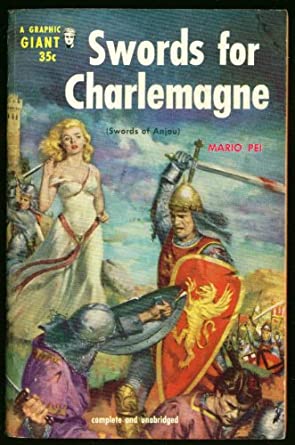Book Review: Swords for Charlemagne by Mario Pei
For seven long years, brother knights Thierry and Huon of Anjou have served their liege lord Roland of Brittany in Emperor Charlemagne’s war to free Spain of Islamic rule. They are proud to have done their bit for chivalry and Christendom. Now, only one Moslem stronghold remains, Zaragoza under King Marsile. But not all the Franks are as high-minded as the brothers. They catch three knights without their identifying livery trying to murder an unarmed man, and in the ensuing altercation are forced to slay them.

The man they rescued turns out to be Roland’s stepfather and rival, Ganelon. He expresses his gratitude, but since the knights attempting to murder him were ones he had cheated of their lands, the brothers are not sure they took the right side. But these concerns are put aside when an embassy arrives from King Marsile. He’s suing for peace; if Charlemagne withdraws from Spain, Marsile will come to France and convert to Christianity. Marsile’s offering high-born hostages as proof of his sincerity.
Someone will have to go to Zaragoza to negotiate. Unfortunately, everyone remembers what happened to the last two negotiators that went to Zaragoza. Accounts vary on whose fault it was, but their heads wound up on spikes. Charlemagne makes it clear that he considers Roland too valuable to risk, and the other lords are not willing to volunteer. Finally, Ganelon is maneuvered into accepting the task, for which he blames Roland. He asks that Thierry and Huon be his guards, as he knows that their chivalry is true even if they don’t like him personally, and also to deprive Roland of their service for a while.
At the farewell feast, Huon makes a gab (a cross between a boast and an oath) in three parts. He will pull on Marsile’s beard, defeat Marsile’s best warrior in single combat, and he will kiss Marsile’s daughter Esclarmonde, said to be the most beautiful of Moslem maidens.
Unknown to the brothers, Ganelon and Marsile’s ambassador have discovered they are kindred spirits, and are hatching a plot to get them both what they want: Charlemagne out of Spain, and revenge on Roland.
This novel was originally published as “Swords of Anjou” in 1953, and retitled for the paperback edition. It’s very specifically Song of Roland fanfiction. The author explains that this is not a historical novel as it’s based on the very ahistorical epic poem written in the late Eleventh Century, which spawned many spinoffs and imitations, the chansons de geste. So he’s taken the main plot of Roland, added the romance of Huon, elevated minor character Thierry to protagonist status, and made up another character out of whole cloth to give Thierry a romance subplot as well.
It’s an approach I’m used to in Arthurian stories, but it works well here with material I’m not as familiar with. It’s also cool that the author’s endnote includes what was actually known about the events that inspired the Chanson de Roland as of the 1950s.
That said, the style it’s written in is very much 1950s historical fiction, with plenty of action, not a lot of deep characterization and just enough acknowledgement of gray areas to make the outcome in doubt.
Dona Elvira Diaz, Thierry’s love interest, is part of that depth. From the Frankish point of view, Charlemagne came to Spain at the request of the Christian King Alfonso, ruler of the few Spanish Visigoth areas remaining, to help drive the infidel from the land. But from the Visigoth point of view, the deeply unpopular King Alfonso invited Charlemagne in to consolidate his own power over his rebellious lords and has become Charlemagne’s vassal. Elvira’s twin brother Bernaldo is one of those rebellious lords who has been fighting both the Moslem occupiers and the Frankish invaders.
Content note: Huon forces a kiss on Esclarmonde as part of his gab; fortunately she’s into it. Ganelon fully intends to rape Elvira and sees no conflict with the fact that he’s already married; he gets as far as attempted rape. Religious intolerance is taken as a given; it’s okay to kill people for not converting to the true faith, and super-merciful to just make them homeless and destitute instead. Trial by combat is considered the highest form of jurisprudence.
Overall: This is a forgotten gem, well worth searching out if you’re into tales of chivalry and feats of arms.

